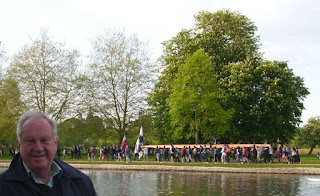I started writing a long time ago. In the past much
of my stuff was technical - reports, conference papers and such, then latterly
books. But I also wrote things for my kids in the early days and did try to get
one of my creations published. It was a long poem called the Bogle of Bump and I must confess that
quite a lot of it was written during interminable meetings! Through the
Campaign for Real Ale I met an illustrator, Liz Worsley, and she prepared some
lovely drawings to accompany the poem. I offered the thing to a few publishers,
but soon gave up. After all, the Bogle of
Bump was really written for my girls, not for the public.
Later, the boys came along and I read the tale to
them whilst showing them Liz's colourful pictures. I think they liked it. Time
passed, the typewritten verses began to yellow and the pictures to fade then,
possibly stimulated by my son's poem , The
House of Stink, which is much better than mine and illustrated by himself (Rafe's
a clever lad), I thought - why not resurrect my old story?
I dug it out, scanned the written sheets and
passed it through some software to change the typescript into text, then
scanned the pictures and chopped them up them to match each verse. Next, I used
PowerPoint to combine the pictures and text exporting these as image files into
the Kindle comic creator. It all took a long time - though not as long as
writing the thing in the first place. And, thirty-nine years after reading it
to Sheena, my eldest daughter, I uploaded the thing onto the Kindle Store: The Bogle of Bump was published as an
eBook!
It's a story about a wicked witch and an ugly
bogle called Bungi, together with pretty fairies who have lost their fairy
light and their sight: good old-fashioned fairy tale stuff with a happy ending.
I don't suppose it will ever sell many copies if any, but I offered it for free
for a couple of days and there were a few takers in the USA, UK, Germany, Italy
and Japan!
Of course, bogles and their like do not age, but
since Bungi Bogle was born in my head it will be his fortieth birthday next
year. When he was conceived, the Internet was just a whisper amongst academics
and a secret tool of the military. There were no mobile phones or personal
computers, microwave ovens were for the rich and the nearest thing to facebook
was a pen pal or two. Nowadays, my Bungi Bogle is dancing around the World Wide
Web!















